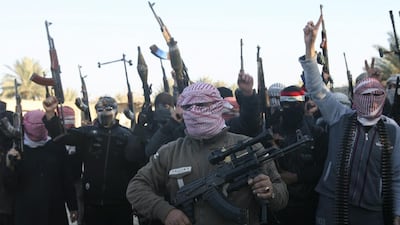There is no embracing term for the countries of the European Union and North America (although “the West” is sometimes used). There is certainly no collective term for Europe, North America and the Middle East. Increasingly, however, the politics of these three regions are linked, particularly as the effect of the Syrian refugee crisis has spilled across borders and seas.
What these three regions have in common today is broad resentment among certain sections of the population, resentment that is manifesting itself in political outcomes that affect everyone.
There are, to simplify, important parallels between the angry men of America and the angry Sunnis of the Arab world. Both want to be great again.
And it is a two-way street. The popular anger that drove large sections of working-class American voters into the arms of Donald Trump will inevitably affect the Middle East, through Mr Trump’s policy. And the popular anger that drove large sections of Iraq’s Sunni Arabs into the protection of ISIL has already had consequences on the streets of America. In such a world, popular discontent in one part of the globe inevitably finds its way to another.
Start with the United States and the United Kingdom. Both had important votes this year and in both the results were decided by mobilising the rising anger, particularly among working-class communities.
Intriguingly, in both cases, politicians responded to questions of security and prosperity by promising to take people back to an imagined past.
This applies to both the political left and the right: for the left, this is an imagined past when globalisation was controlled, when banks were firmly in their place and when national governments made national laws. For the right, their past is a place without immigration, without foreign competition, when national governments made national laws. Seen in this context, both “Make America Great Again” and “Take Back Control” are slogans that promise a return to an imagined – and largely imaginary – past.
The same is true of parts of the Sunni Arab world. In Iraq, in particular, the Sunnis feel their dominant position has been reversed by a US invasion that handed power to the Shia community. Their resentment, based on real grievances, manifested itself as nostalgia for the Saddam era, and then as tacit and overt support for ISIL, who have styled themselves as the defenders of Sunni Islam.
In all cases, the imagined past to which the population wishes to return may not be based entirely in reality – but it feels very real.
So real, in fact, that communities were willing to tolerate people they found distasteful and claims they accepted were fanciful, merely to gain the rewards of this imagined past.
Understood like this, the belief among American workers that Mr Trump would bring back the coal mines or among Iraq's Sunnis that ISIL would restore them to power were simultaneously unbelievable and believed.
But this isn’t only about an imagined past. It is also about security. Across the Arab world, as across America, people are seeking security: in the US from immigration and terrorism; in Iraq from the threat of Shia militias; in Syria, from either the Assad regime or the rebel armies.
In all cases, this desire for security manifests itself in a retrenchment, in a closing-off from other communities, in the retreat to familiar spaces. So in Iraq, some Sunnis desire a “homeland” in the west, separate from Shia and Kurdish Iraqis. In Yemen, southerners want to separate from the north. In Syria, previously mixed towns and villages have separated along sectarian lines. In America and Europe, the borders must be closed. In each case, there is an “other” who is the source of the problems and separation is best.
In all cases, too, the only answer is political. Coexistence and living together is extraordinarily hard: like a bubble, it glistens with the colours of the rainbow and pops suddenly and completely.
The social settlement between different communities in the Arab world, the United States and Europe is always under strain, but for long periods it somehow works. Under extraordinary stress – a financial crisis, a war – it collapses and can take a long time to put together again.
Left alone, these grievances fester and mutate, giving rise to groups and individuals who promise what they can't deliver and use the popular anger as vehicles for their own power.
The only way back is to listen to those grievances and offer an alternative. In the US and Europe, this will mean hearing the pain of these communities and offering them a share in the prosperity of the nations.
In the Arab world, too, it will mean political changes. In Iraq, after Mosul falls, Sunnis must feel they have a stake in the economic prosperity and security of the country. In Yemen, after the war ends, southerners must have their grievances addressed. In Syria, the most complicated of all, however the civil war ends, there cannot be any victor or vanquished, or the cycle of resentment will start again.
Seeking security, prosperity and dignity in an imagined past is a common response to difficult times. It is up to politicians, whether Iraqi, Yemeni, Syrian or American to chart a course to a possible future.
falyafai@thenational.ae
On Twitter: @FaisalAlYafai


